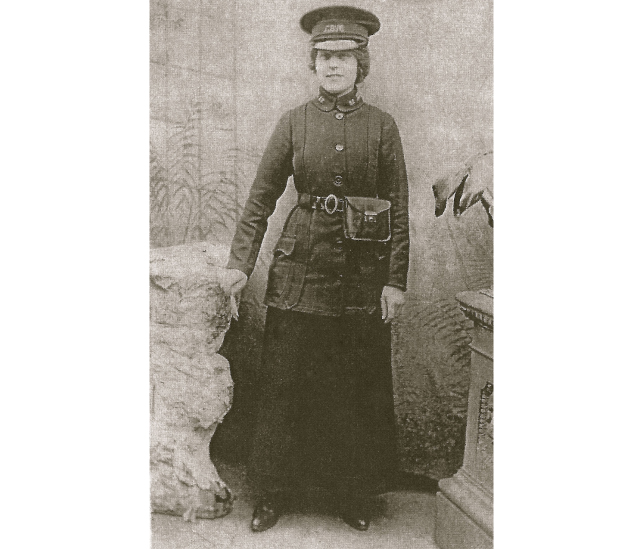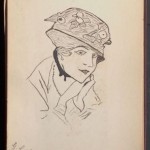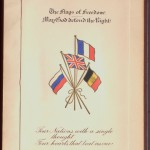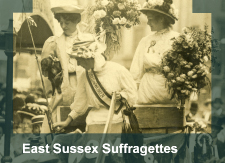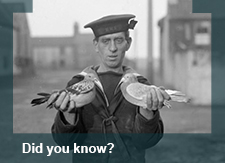During the First World War, Gertrude Coggins served as a ticket collector at Brighton Station.
On Christmas day 1912, Gertrude received an autograph book. Through the entries in this book, we learn something of her life during the years of the First World War.
Her mother worked as housekeeper to Lady Dunn whose properties included a two-floor apartment in Palmeira Mansions, Hove. Gertrude followed her mother into domestic service, and by 1914 she was also working for Lady Dunn and living in Hove.
Brighton and Hove society was flourishing in the months before the war. Gertrude’s autograph book reflects an enthusiasm for the fashions of the time. She included a newspaper cutting about a musical ‘At Home’ given by her employer, Lady Dunn, and Mrs Rosling at Palmeira Mansions during June 1914.
‘Both ladies were assiduous in looking after the welfare of their guests, amongst which were numbers of well known society folk, and the pretty rooms with their charming furniture, and old china were gay with flowers and bright with the tint of many an elegant toilette,’
Only two months later on 4th August 1914, war was declared. The entries in the autograph book show a change of mood. Some verses display the patriotism of the time, others make fun of the German Kaiser, while many still refer to the everyday lives and loves of young people as life continued below stairs.
- Images from Gertrude’s autograph book reproduced by kind permission of Gerald Wheatley
- Images from Gertrude’s autograph book reproduced by kind permission of Gerald Wheatley
As Gertrude’s soldier friends and relations left for war, some wrote verses for her. There is one entry by Gertrude’s future husband, Joseph Wheatley:
I want you just to cheer me
when I’m in the fighting line
That’s why I write these few lines
for the sake of “Auld Lang Syne”
Xmas 1914 J. Wheatley 47903 R.G.A.
When men left Brighton and Hove to join the army and navy, essential services became short staffed and so new job opportunities opened up for women. Gertrude was able to leave her work in domestic service as on 10th May 1915, she started work as a ticket collector at Brighton Station. Years later her son, Gerald Wheatley, remembers her popularity with the station staff:
‘She knew a lot of the railway personnel, you see, because she was in this big station. When I was a kid in Newhaven, she’d go once a week either to Lewes or Eastbourne or another place nearby by train and take me with her, and she’d always stop and talk to the ticket collectors. It was like a Mason’s society, they all knew each other.
She loved her job and I think she really didn’t want to give it up, but she had to when the war ended.’
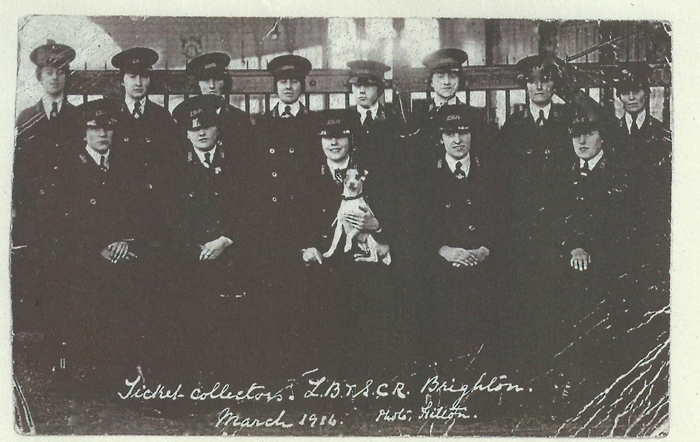
Gertrude Coggins, ticket collector, Brighton Station 1915-1919 (centre, seated). Photographs by kind permission of Gerald Wheatley
As the railwaymen returned to civilian life after the war, the women, who had kept the railway industry going during the war years, were also expected to return to their pre-war occupations and families. Gertrude’s employment at Brighton Station came to an end on 5th December 1919, and the next year she married Joseph Wheatley. They became publicans at the Ark Inn, Newhaven.
The war left its mark on the family as Gertrude’s brother, William, had been killed in action in 1916:
‘He was the only lad in a family of four sisters and he was killed on the Somme in July [1916]. I think the whole family was devastated. My grandmother would never talk about it and nor would any of the girls. I used to ask Mum about my uncle and she’d say, “He was a lovely chap.” And they were all absolutely shattered.
So from the age of five my poppies have gone on his photograph and Remembrance Day really meant something, that’s how it brought it home really.’
After working as a mother and wife, Gertrude’s life was to change again during the Second World War. Her son, Gerald, remembers:
‘And, when the Second World War came, to my surprise she joined up as a temporary civil servant and got a job in the local food office, sorting out the rations books and things like that. She ended up as a personal advisor to the Director of Manpower for Luton and District and she’d never done any office work in her life. I mean she was a clever lass, my Mum! I did admire her really. And she enjoyed [her work], it was quite something.’
This story was submitted by Jo Palache, Brighton Museum and features photographs by kind permission of Gerald Wheatley © Royal Pavilion & Museums, Brighton & Hove
To find out more about people like Gertrude Coggins visit the ‘Untold War Stories’ exhibit at Brighton Museum & Art Gallery

